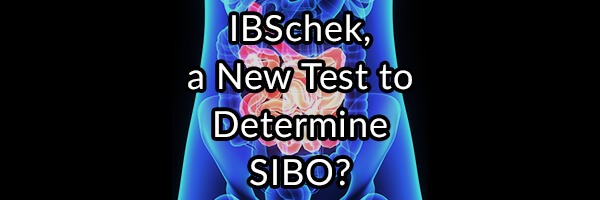A new test has been made available to aid in the diagnosis of SIBO. The test is known as IBSchek and is available through Commonwealth Laboratories, Inc.
Here is a video of Dr. Pimentel discussing the test:
Finally, a blood test that can be used to diagnose SIBO. No more will anyone have to get complicated lactulose breath tests performed to diagnose their overgrowth.
Sadly, this is not the case.
IBSchek
The IBSchek blood test looks for two different antibodies to aid in the diagnosis of IBS / SIBO. The two antibodies are for CDT-b toxin and vinculin.1 2
When someone develops food poisoning, some of the toxins that the bacteria produce are known as Cytolethal Distending Toxin B or CDT-b toxin. Toxins are what make you ill when you get sick from food, in most cases the bacteria that you ingest from poorly prepared food are eliminated by stomach acid upon digestion. CDT-b toxin activates the TRPV1 receptors in the intestines (the same mechanism occurs when you ingest spicy foods), and this irritation causes the intestines to increase chloride and water secretion that causes diarrhea.3 Diarrhea is a defense mechanism by the body to eliminate the toxin quickly. Overgrowth of certain bacteria within the body are also able to produce ample amounts of Cytolethal Distending Toxin B, which can cause chronic diarrhea (IBS-C) similar to food poisoning.4 5
Your intestines have pacemaker cells that determine peristalsis (the waves that push matter through the intestines) known as the interstitial cells of Cajal. The ICC are fibroblast-like cells that act as a pacemaker for the MMC. One of the fundamental underlying causes of SIBO is dysfunction of the MMC, which causes the body not to be able to clear excessive bacteria out of the small intestine back into the large intestine. Excessive amounts of the CDT-b toxin might be able to destroy the interstitial cell of Cajal directly or by the toxin causing the body to produce antibodies against vinculin, harming the ICC later.6 7
Vinculin is a protein that helps connect the interstitial cells of Cajal so that they can be bonded together and communicate appropriately to help the MMC. When the CDT-b toxins harm the ICC, in a state of confusion the immune system “attacks” vinculin because it believes that it is a problem instead of the toxin. In doing so, the ICC are harmed by both the toxin itself and your overactive immune system. The “autoimmune condition” that was caused by the bacterial toxins reduces the function of the MMC significantly and leads to post-infection IBS also known as SIBO.8 9
Why IBSchek is Not a Good Diagnostic Test For SIBO
First off post-infectious IBS (SIBO) does not occur in most people recovering from food poisoning.
Only about 20% of individuals who get food poisoning will produce antibodies to the Cdt-b toxin and will have an autoimmune response to vinculin. If you do not have an appendix, there may be a greater chance of you developing post-infectious IBS (more on the importance of the appendix in a later post.)10 11
Post-infectious IBS is not always the cause of developing SIBO. Post-infectious IBS has occurred from viral gastrointestinal infections and is not known if it can be adequately tested using IBSchek. There are multiple causes of SIBO including, motility issues, PPI use, excessive antimicrobial use, loss of appendix, and infection.12 13
The test is only FDA approved to aid the diagnosis of IBS-D, so if you are suffering from IBS-C you are out of luck at the moment.14
The discovery of IBSchek and the test itself does have a few positives. IBSchek might be able to help diagnose people suffering from SIBO after contracting food poisoning. The test can also contribute to distinguishing between people suffering from post-infectious IBS from food poisoning and IBD.15
We also discovered more information about the different pathways associated with SIBO-D and might be able to use the new understanding of CDT-b toxin, vinculin, and the interstitial cells of Cajal, to help improve the lives of people with SIBO.
Hopefully, one day there will be a blood test that can completely aid us in the diagnosis of SIBO. Until then we will have to rely on breath tests, stool tests, and biopsies.
- http://ibschek.com/hcp/faq/ ↩
- http://journals.plos.org/plosone/article?id=10.1371/journal.pone.0126438 ↩
- http://www.mdpi.com/2072-6651/2/7/1848/htm ↩
- http://www.mdpi.com/2072-6651/2/7/1848/htm ↩
- http://www.ncbi.nlm.nih.gov/pubmed/14605183 ↩
- http://www.townsendletter.com/FebMarch2015/sibo0215.html ↩
- http://siboguru.com/is-ibs-an-antibiotic-responsive-disease/ ↩
- http://www.townsendletter.com/FebMarch2015/sibo0215.html ↩
- http://siboguru.com/is-ibs-an-antibiotic-responsive-disease/ ↩
- http://politicalblindspot.com/scientists-finally-discover-the-function-of-the-human-appendix/ ↩
- http://blogs.scientificamerican.com/guest-blog/your-appendix-could-save-your-life/ ↩
- https://fixyourgut.com/treatment-of-gerd-protocol-1-sibo/ ↩
- http://ibschek.com/hcp/faq/ ↩
- http://ibschek.com/hcp/faq/ ↩
- http://ibschek.com/hcp/faq/ ↩







I just spoke with a SIBO specialist who has found this test to be very useful in her practice. There *are* cases of SIBO due to this antibody. It’s always good to know the cause of motility problems so it can be properly treated. It’s much better than guessing, especially in complex, chronic conditions where the person has a lot of different stuff going on. And I wouldn’t call it a “blood test for SIBO,” I don’t think that’s ever how they intended this test to be used. It’s a blood test to detect a certain form of motility problem that can lead to SIBO.
Hi John,
What is the name of this company that sells Restore? Any more research on this? Thank you!
Judith with SIBO
Biomic Sciences. No, I have recommend it to some clients with no success stories, nothing like they promise on the website. No, in vivo research, just one in-vivo study saying it may help close the gut junctions in people with leaky gut.
“The test is only FDA approved to aid the diagnosis of IBS-D, so if you are suffering from IBS-C you are out of luck at the moment. The discovery of IBSchek and the test itself does have a few positives. IBSchek might be able to help diagnose people suffering from SIBO after contracting food poisoning.”
John, those words of yours, with which i see no fault, may be usefully compared with a comment i saw on an ibs board:
“My take is its (the test) worth it because the link between the anti-vinculin and anti-cdtb antibodies and SIBO is not well established. If you know you have anti-vinculin floating around, then you definitely know your body is attacking the nerves of your gut. With this information, you can look for remedies to tame down your anti-vinculin antibodies as the research comes out.”
I think this is what you are getting at when you say “..and might be able to use the new understanding of CDT-b toxin, vinculin, and the interstitial cells of Cajal, to help improve the lives of people with SIBO.”
In other words, what im driving at is the same as what the IBS forum poster, namely, what does it hurt to find out and take ibschek, whether your SIBO is diarrhoea or constipation dominant, to see if you have one or both of those toxins floating around your system, since the relationship is poorly understood and we may yet find out that they have a relationship to both kinds of SIBO?
Am I right in what Im getting at here? Isnt it worthwhile for every SIBO sufferer to take Ibschek?
I’m curious if you have found ways to repair the interstitial cells of Cajal or vinculin production. Dr. Siebecker lists prokinetics to speed motility, but what ways can the process be repaired without needing an aid all the time?
Thanks
Michelle
PS this was an *excellent* article. I’m sorry no one complimented you on it until now. :-)
Possibly, a product called Restore. That being said there is little science associated with the product but it is worth a shot.
hormones in saliva heal gut cells, possibly there is prescription of such a thing but i just use saliva stimulating lozenges or normal gum.. also Glutamine before bed 5 grams.
I did not mention that the test was useless at all in the blog article. I just mentioned that it is not as useful as it is made out to be.
There ARE uses for this test; I think your reaction that “test is useless” is unwarranted. Your own text states that for people with IBS-D there IS a use for this test!